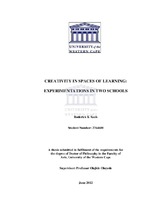Creativity in spaces of learning: experimentations in two schools
Abstract
The questions concerning how creativity can enhance the culture of learning in schools, especially amongst the previously marginalized groups, are not simple and straightforward. In South Africa, the general questions often posed are: “What form of creative activities exists in schools?” and “How do learners’ develop creativity that improves life skills?” This study provides empirical findings that suggest answers to these questions. It focuses on how creativity can enhance the culture of learning and why it is significant in nation building. In particular, the results of the study show, through experimental exercises with learners and observational data, that the arts may be regarded as a mechanism to enhance creativity in spaces of learning for the vast majority of people in South Africa. The analysis revealed that in-school-time participation in the arts transformed the conditions for and structure of participation in different phases during schooling. The experimentation showed the learners making choices and participating in all forms of activities. As the in-school-time learners developed experience, self-esteem, and competence in the arts, their life and labour skills developed. The results also revealed that primary experiences provide learners with a head start in learning – from commitment (motivation) to enhancement (learning how to learn) to competency (skills). Thus, the basis for the enhancement of creativity is how learners participate as this affects the intensity with which they learn how to learn. The study concludes with suggestions for the implementation of various educational endeavors in the application of creativity as an enhancement for a substantial education that can play a major part in social, political, and economic development and prosperity in South Africa.

